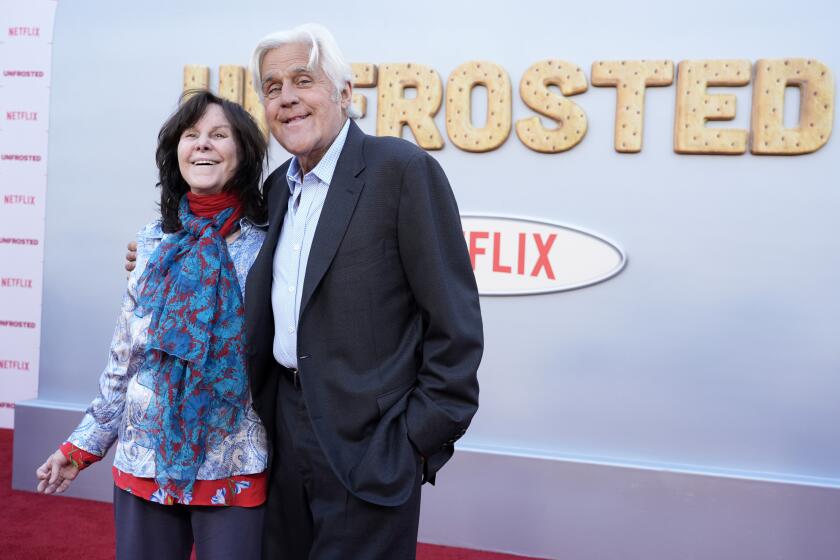Film Firms Object to Donation Requests
- Share via
In October, a production company associated with Sony Pictures was gearing up to shoot crucial street scenes on Hollywood Boulevard for a Harrison Ford movie.
Days before cameras were to roll, a city councilman threw up a roadblock. Eric Garcetti, who represents the Hollywood area, told the production team he might not support closing a section of the boulevard unless it paid at least $10,000 for a study of traffic problems caused by filming in the area. That unbudgeted expense would be in addition to the thousands of dollars in film permit fees and services, including money for planning traffic rerouting, that the company had paid already.
Garcetti’s predecessor, Jackie Goldberg, had demanded that three filmmakers donate as much as $10,000 each to charities in exchange for her support in closing the Glendale Freeway between 1998 and 2000.
Over the years, production officials have come to expect unforeseen expenses, such as payments that are sometimes made to merchants and neighborhood associations in exchange for their promises not to complain about filming. But when elected officials use the power of their offices to demand donations or payments not required by law in exchange for their support, production crews have cried foul.
Two government experts say council members should not make such individual demands.
That practice “can lead to corruption and favoritism,” said Steven Frates, senior fellow at Claremont McKenna College’s Rose Institute of State and Local Government. “It runs counter to most precepts of good public policy and of open, accountable government. There is no law that says City Council members can run individual fiefdoms in their districts.”
Robert Stern, president of the Center for Government Studies, a Los Angeles-based nonprofit group that researches government, economic and social problems, said there is nothing wrong with government’s requiring private firms to pay to mitigate the effects of their activities, but it should not be at “the whim of the council member.”
Though individual council members do not have the legal power to deny permits in their districts, production companies face difficulties in obtaining permits for major closures without their support. The city issues filming permits and approves most street closures, but Caltrans must approve closing a freeway.
Defending Communities
Garcetti and Goldberg defend their actions, saying that they were standing up for community interests, and made their requests only when filmmakers sought to close major thoroughfares.
Garcetti said his request to Sony was the first he had made to a movie company for money. He said he was getting dozens of complaints a day in Hollywood about the amount of shooting and the traffic problems, and decided to do something about it.
Goldberg, who has since been elected to the Assembly, makes no apology for having requested that movie companies make contributions, saying she asked for them in only a handful of cases when filming would significantly affect a neighborhood. Goldberg said her office usually gave production companies five charities from which to choose; film producers say Goldberg’s office named a single charity.
Commercial producer Lance O’Connor, whose Flying Tiger Films paid $2,500 to a charity to win Goldberg’s support for closing about a mile of the Glendale Freeway for 19 hours one Sunday, expressed outrage.
‘Not Pocket Change’
“Why should I be paying contributions to anybody when I’m trying to follow the proper procedures for filming in this town?” O’Connor said. “I already have to pay a fortune for permit fees. This was not pocket change for me.”
To film in Los Angeles, producers must pay thousands of dollars for such services as fire inspections, police monitoring and traffic rerouting plans, as well as a $450 permit application fee to Entertainment Industry Development Corp., which coordinates film permitting for the city and county.
In Sony’s case, the Hollywood Boulevard location was important because the movie, “Hollywood Homicide,” is set in Hollywood. Two Cops Productions, which was shooting the movie for producer Revolution Studios, sought to close two blocks for two days between Sycamore and Highland avenues.
Garcetti said it was the number of shoots that prompted his concern. Paramount Pictures had recently shot “The Italian Job” on Hollywood Boulevard, and Sony had already requested street closings for a sequel to the movie “Charlie’s Angels” and for the action film “S.W.A.T.”
Residents and business owners throughout Los Angeles often complain that production companies run roughshod over their neighborhoods, leaving litter and obstructing traffic. Garcetti said Sony officials told him they had already invested $800,000 in the location shoot and would lose that money if the street closing was denied. The councilman told the studio that there was too much filming in Hollywood, and suggested that Sony pay for a traffic study that would cost $10,000 to $25,000.
‘Part of the Solution’
Garcetti acknowledged that he had told Sony: “We need you to pay directly or consider paying directly for a traffic mitigation plan.” He said he also told Sony: “We want you to be a part of the solution and, if you’re not, then we’re going to have a hard time signing off on this.”
Garcetti said later that he had meant he would have trouble signing off on Sony’s request for other productions unless the studio paid part, not all, of the cost of a traffic study. Garcetti said that he planned to get other studios to pay also and that, if they didn’t, he would withdraw his support for all future filming on Hollywood Boulevard.
Sony spokeswoman Susan Tick said Garcetti at the time asked Sony and Two Cops to pay the full cost of the study. Given the timing of the request, they agreed.
Garcetti acknowledged last month that he had never approached any other movie company for contributions to the study, and he has at least temporarily dropped his demand from Sony and Two Cops, saying: “The film shoots have decreased quite a bit since then.”
But if movie companies start lining up for shooting permits on Hollywood Boulevard and residents again start complaining, Garcetti said, he might revive his idea for a traffic study.
In Goldberg’s case, the former councilwoman solicited contributions to charities from three production companies that were seeking permits from Caltrans to close a section of the Glendale Freeway for filming in her district.
Production officials said they believe they would not have gotten the permits had they refused to donate the money.
David Thornsberry, location manager for “Crocodile Dundee in Los Angeles,” said Goldberg’s office asked him to make a donation in September 2000 when the film company sought to close both sides of a mile-long section of the Glendale Freeway from the Golden State Freeway to Glendale Boulevard. Thornsberry, a location manager for 12 years, said the request had surprised him.
The movie scene involved having a helicopter land on a jammed thoroughfare, which would have closed the freeway on a Saturday between 5 a.m. and midnight. “If we didn’t pay, I wasn’t going to get it,” Thornsberry said. He said the production company, Silver Lion Films of Santa Monica, wrote a check directly to a charity suggested by Goldberg’s office. He said he couldn’t remember the exact amount requested, but the payment “was for several thousand dollars.”
In the case of Flying Tiger Films, the Santa Monica-based company sought a permit to close the northbound lanes of the same stretch of the Glendale Freeway to film an Amica insurance company commercial in December 1998.
Taken Aback
A Nov. 25, 1998, letter from Goldberg to the location manager, David S. Ferdig, thanked Flying Tiger “for your agreement to make a contribution of $5,000 to the community.” But Ferdig said the agreement had been anything but voluntary. An employee in Goldberg’s office “didn’t want to approve the shoot without the check,” he said.
Ferdig said he had been taken aback that Goldberg’s office would make such a request and shocked at the amount the office initially sought, which was $10,000.
The letter directed Ferdig to make out the check to the Los Angeles Center for Educational Research and send it to Goldberg’s office, permit records at Caltrans show. Ferdig said he had no choice of charity. “It’s not like I could pick the charity and give it to the Boy Scouts,” he said.
Ferdig and his producer, O’Connor, refused to pay $10,000 and began negotiating with Goldberg’s office. Ferdig credited the Entertainment Industry Development Corp. with stepping in “at the 99th hour” to approve their film permit even though the negotiations had not concluded with Goldberg’s office.
The production team negotiated the amount down to $5,000, they said, then finally to $2,500.
Goldberg said she is on the advisory board of the nonprofit educational research center but has no financial ties to it or other organizations for which her office solicited donations. She also said her position on the center’s advisory board did not influence her decision to include it on her list of charities.
Goldberg said she doubted that there had been a negotiation or that her staff had asked for a precise amount. She said her staff had erred when it directed the check to be routed through her office, saying that was inappropriate.
“I’m embarrassed by that,” Goldberg said.
The same year, Goldberg’s office also sought a donation to charity from the production team for “Bowfinger,” according to two sources close to the Steve Martin/Eddie Murphy comedy. When Imagine Entertainment’s production crew sought a permit to close the same stretch of the Glendale Freeway, Goldberg’s office asked for contributions totaling $10,000, which the production paid.
The “Bowfinger” request -- to close the freeway in both directions from 7 a.m. to 8 p.m. on a Saturday and Sunday in August 1998 -- was granted.
*
Times staff writer Ted Rohrlich contributed to this report.
More to Read
The biggest entertainment stories
Get our big stories about Hollywood, film, television, music, arts, culture and more right in your inbox as soon as they publish.
You may occasionally receive promotional content from the Los Angeles Times.










